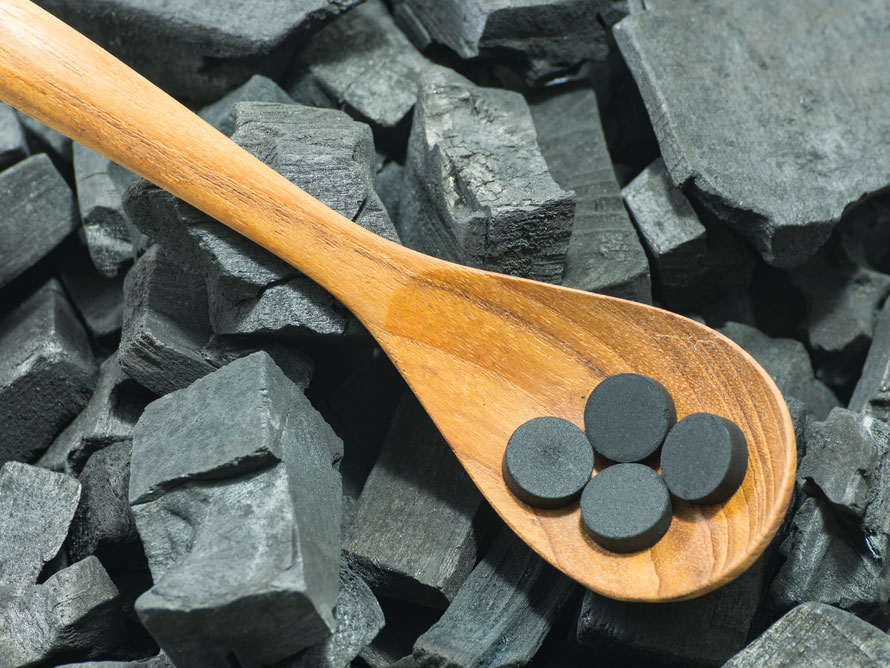Introduction
Charcoal is usually made of coal, wood or coconut shell. An activated charcoal is very similar to common charcoal.
It is a fine black odourless and tasteless powder used for treatment and regarded as medicines.
Activated charcoal has been used since ancient time to treat various types of illness including poisoning. The healing property of activated charcoal has been recorded since 1550 B.C by the Egyptians.
How does activated charcoal act as medicines
To produce the activated charcoal, common charcoal is exposed to high temperature. Internal spaces or pored are developed through the heating process.
The pores act as a form of trap or chemical absorber. The pores prevent from certain types of poisons ingested absorbed by the stomach into the body.
Activated charcoal binds to irritating or toxic substance in the stomach and intestine. Hence, this prevents the toxin from being absorbed into the body. Thus, the toxin bound by the activated charcoal will be excreted from the body through stool, unaffecting the body.
This distinct characteristic is useful for the treatment of food or chemical poisoning, acute diarrhea, bloated and stomach upset.
Indication
In Malaysia, activated charcoal is indicated in the treatment of diarrhea and food poisoning. In addition, activated charcoal also helps in reducing absorption of drugs, plant, inorganic poison and chemicals in poisoning by ingestion cases.
Activated charcoal availability in Malaysia
Activated charcoal are available in two forms in Malaysia:
- activated charcoal tablet; 250mg per tablet
- activated charcoal powder
Dosing
The dose of activated charcoal differs according to patients’ condition.
Single dose activated charcoal or multiple dose activated charcoals are given in cases of poisoning. This depends on the severity of the condition. It is up the healthcare providers to opt for the best treatment for patients’ benefit.
For treatment of diarrhea and food poisoning: from 500mg to 1g and repeated 3 to 4 times daily. Children are usually given half of the adult dose.
If the goal of treatment is to reduce the absorption of drugs, plant, inorganic poison and chemicals in poisoning cases, activated charcoal powder is administered in the form of slurry. However this form of treatment is usually administered in the hospital. The dose depends on the severity of the condition.
Safety and efficacy
In adults, activated charcoal is relatively safe when used in short amount of time.
Activated charcoal may cause constipation and black stools as side effects. Serious or rare side effects include intestinal tract blockade, vomiting and dehydration.
SPECIAL PRECAUTIONS & WARNINGS:
Pregnancy and breast-feeding:
Caution should be practiced in pregnant and breastfeeding mothers. Charcoal is safe if taken in short period of time. However, make it a point to consult your healthcare professional before using if you are pregnant. Activated charcoal is not known to cause harm to nursing babies.
Gastrointestinal (GI) blockage or slow movement of food through the intestine: Never take activated charcoal if you have any kind of intestinal obstruction.
Activated charcoal is contraindicated in patients with compromised or slow movement of the bowel or clinically termed reduced peristalsis, unless directly supervised by the doctor.
Interactions with drugs and food
Drug-Drug Interaction
- Never take activated charcoal together with syrup ipecac (which, may be found in cough mixture). Activated charcoal can bind with syrup of ipecac in the stomach. This results in decreased effectiveness of syrup of ipecac.
- Activated charcoal interacts with alcohol. When taken with alcohol it may results in decreased effectiveness of the activated charcoal.
- Activated charcoal acts as adsorbent, taking it with any other medication by mouth results in decreased effectiveness of the medicines. To prevent this from happening, allow at least an hour gap between taking activated charcoal and other medications taken by mouth.
In addition activated charcoal may also interact with acarbose, carbamazepine, digoxin, frusemide, olanzapine, and phenytoin. Activated charcoal decreased the effectiveness of these drugs. Hence, results in reduced absorption of oral therapy and compromised with the effectiveness. Thus, simultaneous oral therapy should be avoided.
Drug Food Interaction
Food such as ice cream, sorbet and milk may decrease the absorption of charcoal.
Additional Advice
Activated charcoal is available is Malaysia as a non prescription medication. Thus, it can be bought at retail pharmacy without prescription.
However, in the case of poisoning, seek medical attention first or call the hospital emergency room or doctor’s office for advice.
For further enquiries on activated charcoal call National Pharmacy Call Centre at 1800-88-6722 (NPCC).

Picture courtesy of shuttershock.com
References
- Activated Charcoal retrieved on 27th April 2016 from http://www.webmd.com/vitamins-supplements/ingredientmono-269-activated%20charcoal.aspx?activeingredientid=269&
- Activated Charcoal retrieved on 27th April 2016 from http://www.mayoclinic.org/drugs-supplements/charcoal-activated-oral-route
- Activated Charcoal, MOH Drug Formulary
- Activated Charcoal retrieved on 27th April 2016 from http://www.emedicinehealth.com/activated_charcoal/page2_em.htm
| Last Reviewed | : | 24 October 2016 |
| Writer | : | Siti Nurul Fathihah bt. Baharuddin |
| Accreditor | : | Rozian bt. Abu Chik |







